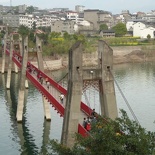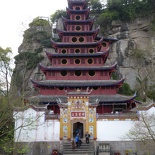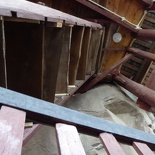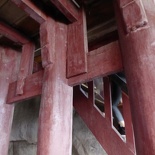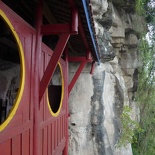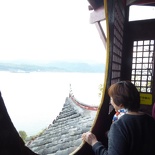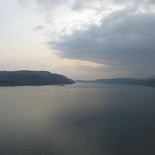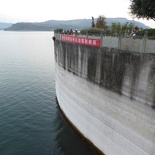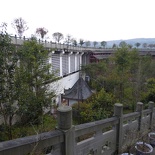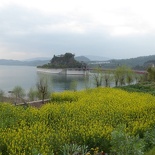The Shi Bao Zhai is an island rocky and craggy hill along the bank of the Yangtze River Chongqing (Zhong County), China. The UNESCO heritage site is home to a temple on the top of the hill and an iconic wood Red pavilion pagoda which what is the Shi Bao Zhai is known for. Translated into “Precious Stone Fortress”, this hill has extremely steep sides about 200 meters tall and sits smacked right on an island in the middle of the flow of the Yangtze river. Most cruise ships will dock off the town of Chang Jiang to visit the attraction.
The 12 storey pagoda was first built over 270 years ago as a means of monks and devotees to get up the temple located on the summit of the hill. The temple at the top was built during the reign of Emperor Qianlong (1736- 1796) of the Qing Dynasty. With several attars, courtyards and Chinese gardens. Prior to that, getting up the hill involves chain hoists which a treacherous affair, with people often falling off the cliff-side trying to get up. The Shi Bao Zhai Red pavilion pagoda is a 270 year old marvel in its own right, and constructed purely out of wood, with an internal staircase bringing devotees 10 floors up the cliff face.
The island is accessible via walkway bring with suspension-like wooden floor with rocks as you walk on it. There you have the option to tour around the concrete retaining newly built mini gardens surrounding he pagoda where you can make you way to the pagoda first floor and start climbing up. 10 floors of climbing gets you to the cliff top, with each floor being increasingly smaller and smaller. The last two floor of the pagoda are part of a lookout tower with the top floor accessible via an iron ladder.
The pagoda stood the test of time against strong winds and coastal erosion. The unique large circular open pagoda windows allows the force of the wind to run right through the structure. This greatly reduced the wind force load on the structure, allowing it to withstand the torrential strong winds which is notorious for wind erosion in the region. What is amazing too is that the Pagoda was built completely out of wood, with no nails or metals fasteners holding the entire structure in place. It can even take a fully loaded 20+ people on each floor and on the stairs with ease. When inside, you can make out the complete design of interlocking arms and pegs which hold the various wooden assemblies together.
The structure and island were initially at risk from rising water levels and flooding from the Three gorges dam construction, rising beyond the first storey of the pagoda. With the pagoda is firmly embedded into the cliff face, moving the entire hill and scared pagoda without damage was not an option. What Chinese engineers devised to save the scared pagoda in-situ, was to spend $12M USD to construct a fortress-like solid concrete retaining wall all round the island. But this means having to demolish the classical village houses residing on the lower parts of the island, retaining only the pagoda and the three story temple on the top of the hill.
The pagoda itself from an engineering stand point is an elaborate work of art. With the new retaining walls and protection from the Yangtze, this can easily put the temple good for another 300 years of useful life.
Shi Bao Zhai Pagoda photo gallery.


